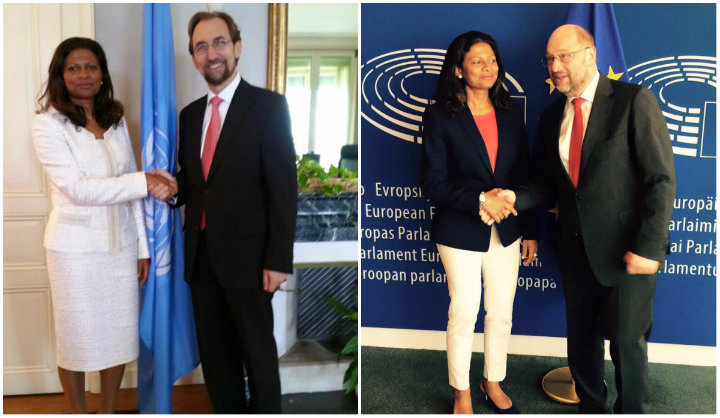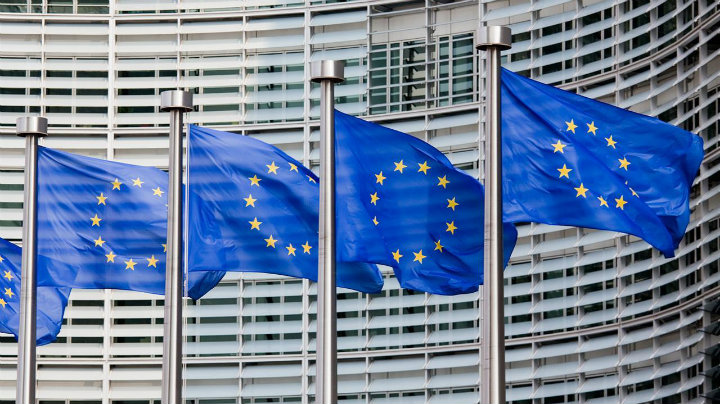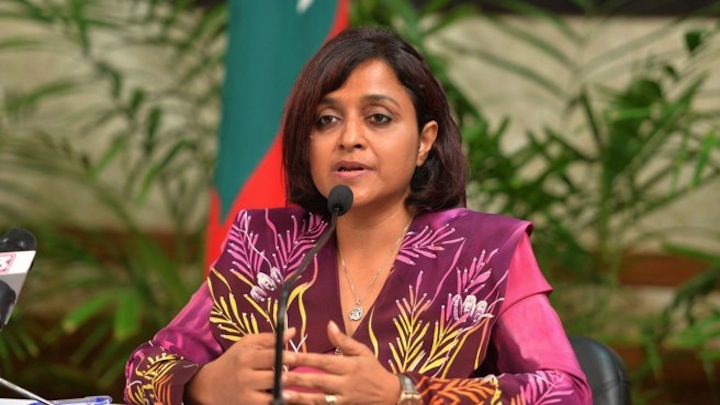Maldives’ permanent representative to the EU Ali Hussein Didi has criticised the Commonwealth’s involvement in the Maldives, telling the European Parliament that the Commonwealth’s Ministerial Action Group (CMAG) lacked a clear mandate to place the Maldives on its agenda.
Following former President Mohamed Nasheed’s claim he was deposed in a coup d’état, the Commonwealth suspended the Maldives from the CMAG, and said it had decided to place Maldives on its formal agenda because of “questions that remain about the precise circumstances of the change of government, as well as the fragility of the situation in the Maldives.”
However, in a statement obtained by Minivan News provided to a monthly EU parliamentary session on South Asia, Didi said the situation in the Maldives did not allow for the country to be placed on the Commonwealth’s agenda.
Didi said the enhanced mandate of the CMAG approved in Perth in October 2011 only allowed the organisation to place a country on its agenda if there was: “(1) unilateral abrogation of a democratic constitution or serious threats to constitutional rule; (2) the suspension or prevention of the lawful functioning of parliament or other key democratic institutions; (3) the postponement of national elections without constitutional or other reasonable justification; and (4) the systematic denial of political space, such as through detention of political leaders or restriction of freedom of association, assembly or expression.”
“As you would agree, the Commonwealth Ministerial Mission that visited the Maldives from 17-19 February was not able to determine whether any of the above four conditions exists in the Maldives,” Didi claimed.
But the government of Maldives will continue to extend “maximum level of cooperation” to the Commonwealth “despite the fact that, in our opinion, the CMAG lacks a clear mandate to place the Maldives on its agenda,” Didi said.
In his five page statement, Didi further criticised the CMAG for not responding to requests for assistance to the government’s inquiry into the transfer of power, and reiterated the government’s commitment to holding presidential elections in 2013. He also claimed President Nasheed was ousted in a widespread popular uprising following Criminal Court Head Judge Abdulla Mohamed’s detention and said that normalcy and stability had returned to the Maldives.
Further criticisms
The CMAG and the EU have called for an independent and impartial investigation into the transfer of power and urged the Maldives to hold an early presidential election within the calendar year.
New President Dr Mohamed Waheed Hassan set up a three member Committee of National Inquiry (CNI) to investigate the circumstances surrounding Nasheed’s resignation, but the CMAG has challenged the committee’s independence, and in April warned of “further and stronger” measures should the Maldives fail to review the committee’s composition and mandate.
However, Didi supported the CNI’s independence and said the Commonwealth and the United Nations had not responded to requests for technical and legal assistance for the CNI.
Spokesperson for the Commonwealth Secretariat, Richard Uku had previously told Minivan News that the CMAG remained “ready to assist the Commission as soon as broad-based political agreement is reached on its composition and terms of reference.”
Didi also acused the CMAG of failure to respect understandings reached by the Maldives government and the Commonwealth’s Special Envoy Sir Don McKinnon. He did not provide details on the nature of the understandings reached between the government and McKinnon.
“Yet, I note with regret that the understandings we reached with the Secretary General’s Special Envoy, H. E. Sir Don McKinnon has not been respected by the CMAG or the Commonwealth Secretariat. The cooperation we give to the Commonwealth is not reflected in the statements issued by the CMAG. My government would therefore need the assurance from the Commonwealth Secretary General that the organisation’s interaction with the Government of Maldives is serious and that any understanding reached with the Government would fully be respected,” Didi said in his statement.
Commission of National Inquiry
Didi said the CNI “is conducting its work in complete independence from the Executive and other branches of government.”
He also provided details on the government’s efforts to make the CNI acceptable to President Nasheed and to solicit international assistance.
“Names of the Commission members were shared with the MDP through international partners but no response was received. Eventually, the Government had to establish the Commission with the consultation and guidance of members of the international community. Although the Commission comprises officials with immense integrity and respect in the country, it has requested both the Commonwealth and the United Nations for technical and legal experts to assist the Commission in carrying out its work. The terms of reference of the request experts were drawn up in close consultation and in complete agreement with the Commonwealth Secretariat. Despite repeated follow-ups by the Government, there has been no response from any of the two organizations to the request.”
Didi further claimed President Nasheed had not exhausted domestic legal avenues for justice.
“His own party’s Vice President Alhan Fahmy, MP, called for a parliamentary inquiry into the events that led to transfer of power. However, this was also later withdrawn from Parliament when Nasheed decided he did not want inquiry from taking place,” he claimed.
Fahmy had submitted the resolution to Majlis’ National Security 241 committee. Nasheed’s Maldivian Democratic Party (MDP) MPs said they had walked out of the committee because the committee was chaired by MP Gasim Ibrahim who they accuse of funding the alleged coup d’état.
Early election
Didi noted the EU’s call for early elections, but said that July 2013 was the earliest date allowed for elections in the constitution. Further, an early election could not be held while the Office of the President continues to be occupied, he claimed.
“When Maldivians voted in 2008, they voted for a President and a Vice-President. Every vote that Mr Nasheed received was also received by Dr Waheed. The Vice- President is elected for the primary purpose of filling the office of the President, should it become vacant during the term of Presidency, for any reason,” the statement said.
“Normalcy has returned”
Didi also assured the EU parliament that “stability and normalcy” had returned to the Maldives.
“The political situation in the Maldives is stable and normalcy has returned to the country. All state institutions are open, and fully functional. The schools are open, and functioning as normal. Hundreds of tourists visit the Maldives every day. In short, people in the Maldives go about their lives as normal.”
According to Didi, Dr Waheed’s administration was “committed to enact reform legislation, strengthening judiciary, building capacity of independent oversight bodies, modernising the criminal justice system and fighting corruption.”
He alleged corruption was “endemic” in Nasheed’s administration and claimed that President Waheed had set up a “High Level Task Force” to ensure compliance with the Anti- Corruption Commission and Auditor General’s reports and recommendations.
Nasheed left the Maldives at the verge of bankruptcy, Didi alleged, saying that Maldives’ debt had risen from 46 percent of GDP to 88 percent of GDP during Nasheed’s tenure.
“A team of IMF officials that visited the Maldives a few days back issued a stern warning to the Government that unless painful measures are taken urgently, the Maldives faces economic and financial crises within a matter of few months,” Didi claimed.
“Widespread popular uprising”
Didi claimed President Nasheed resigned following “a widespread popular uprising” after Nasheed “abducted” Criminal Court Chief Judge Abdulla Mohamed.
The judge was not granted access to a lawyer or family for 22 days and refused to obey a Supreme Court ruling to release the judge, spurring a series of nightly protests against Nasheed, Didi said.
“The Government’s response to the protests was the use of tear gas and arrests. Simultaneously, however, hundreds of convicted criminals were released from the prison, and were put on the streets to clash with the protesters,” the statement read.
After 22 days of protests, Nasheed’s administration ordered the police to withdraw from the streets, “and the protesters from both sides were left to fight physically and the security forces were ordered to do nothing,” Didi said.
“Reporters and protesters were getting serious injuries and taken to hospital in numbers. Eventually, the police who had been withdrawn from the site, decide, on their own volition, to go and stop the clashes and implement law and order. All of this was being broadcast live on TV and was witnessed by the people of the Maldives.”
“Following this, orders were given to arrest the police officers, who had intervened, upon their return to the Police Headquarters. At which point, majority of the police force decided to join hands and took their position on the square in front of the Police Headquarters and MNDF Head Quarters. Then began the police and armed forces stand-off. In the ensuing time, President Nasheed decided to resign,” the statement narrated.
MDP Spokesperson Hamid Abdul Ghafoor refuted claims of popular uprising saying the protesters only numbered a few hundred people consisting of “police in plain clothes and opposition party members who were paid to protest.”
Further, Ghafoor said Judge Abdulla had been granted access to a lawyer and family members, but had refused to see his family. Hamid also noted that the Human Rights Commission (HRCM) had visited the judge on January 20 and told media that the judge was in good health, and had the ability to freely roam the island.
Hamid also condemned Didi’s failure to include in his report the police’s ransacking of MDP offices in the early hours of February 7, the hijacking of state broadcaster MNBC One, and the police’s brutal crackdown on Nasheed and his protesters on February 8.
Read the government’s full statement to the EU (English)
Likes (0)Dislikes
(0)Dislikes (0)
(0)
 (0)Dislikes
(0)Dislikes (0)
(0)

